

The Top 7 Hybrid Mobile App Frameworks. Layout managers provide flexible frameworks to layout user interface elements in an Android application.
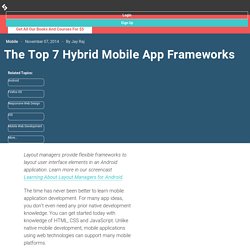
Learn more in our screencast Learning About Layout Managers for Android. The time has never been better to learn mobile application development. 10 Best Free Mobile Application Development Frameworks That Support Android. If you’re developing Android-based games or complex apps with extensive cloud integration, you’ll probably want to seek out native application development tools.
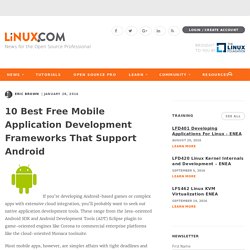
These range from the Java-oriented Android SDK and Android Development Tools (ADT) Eclipse plugin to game-oriented engines like Corona to commercial enterprise platforms like the cloud-oriented Monaca toolsuite. Most mobile apps, however, are simpler affairs with tight deadlines and budgets and the need to support both Android and iOS. For most app developers, especially those converting web apps to mobile, cross-platform mobile app frameworks are a better choice. And the latest mobile frameworks promise some native-like performance and functionality while still hewing to a basic “write once, run anywhere” development approach.
Requirements. 5 Mobile Web App Frameworks Face Off - Enterprise Technology News. 10 Best Frameworks for Creating Hybrid Mobile Apps. A hybrid application refers to something that combines elements of both native as well as web applications.
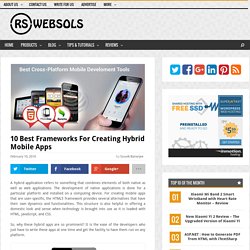
The development of native applications is done for a particular platform and installed on a computing device. For creating mobile apps that are user-specific, the HTML5 framework provides several alternatives that have their own dynamics and functionalities. This structure is also helpful in offering a domestic look and sense when technology is brought into use as it is loaded with HTML, JavaScript, and CSS. So, why these hybrid apps are so prominent? It is the ease of the developers who just have to write these apps at one time and get the facility to have them run on any platform. The below provided is a cluster of HTML5 frameworks for the comfort of programming and designing: 1. Sencha Touch, an enterprise-grade object, facilitates in the development of cross-platform web apps with the use of HTML5 and JavaScript. 2. 3. 4.
10 Best Hybrid Mobile App UI Frameworks: HTML5, CSS and JS. Native developers love working with native code but that doesn't always go well with the business case or result in effective use of effort and time.
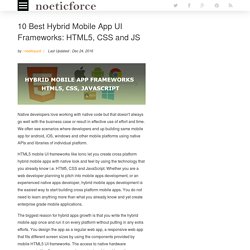
We often see scenarios where developers end up building same mobile app for android, iOS, windows and other mobile platforms using native APIs and libraries of individual platform. HTML5 mobile UI frameworks like Ionic let you create cross platform hybrid mobile apps with native look and feel by using the technology that you already know i.e. HTM5, CSS and JavaScript. Whether you are a web developer planning to pitch into mobile apps development, or an experienced native apps developer, hybrid mobile apps development is the easiest way to start building cross platform mobile apps. You do not need to learn anything more than what you already know and yet create enterprise grade mobile applications. Over the last few weeks, I have been busy evaluating the HTML5 mobile UI/UX frameworks. Ionic You can read more about Ionic at - ionicframework. Ionic: Advanced HTML5 Hybrid Mobile App Framework. Comparing The Top Frameworks For Building Hybrid Mobile Apps.
Danny Markov Only a few years ago, developing mobile apps via JavaScript was nothing more then a quirky experiment.
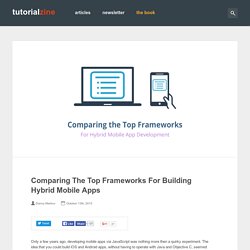
The idea that you could build iOS and Android apps, without having to operate with Java and Objective C, seemed appealing to many web devs. Now we have a plethora of frameworks bringing us closer than ever to creating a native mobile experience using only web technologies. What are Hybrid Mobile Apps? A hybrid app is just a regular mobile optimized website, written in CSS, HTML and JavaScript, that is displayed in a webview (this is a basically a stripped down web browser).
In this article we’re going to compare the most popular JavaScript frameworks for building hybrid and native mobile apps. 1. Ionic Ionic is the most popular framework on our list and probably the first choice of many developers. Pros: Works with predefined componentsGreat communityCommand Line Interface with lots of useful features Cons: You need to know AngularJS to do anything complex 2. 10 Frameworks to Build Mobile Application with HTML, CSS & JavaScript. For many web developers, which may only be familiar with HTML, CSS, and JavaScript, developing a native mobile app could be unfamiliar territory.
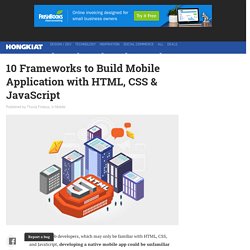
Technically speaking, mobile apps in Android, iOS, and Windows Phone are built using completely different programming languages; an Android app uses Java, an iOS app uses Objective-C, while a Windows Phone app uses .NET. But now, anyone with a decent knowledge of HTML, CSS, and JavaScript can build a mobile application.